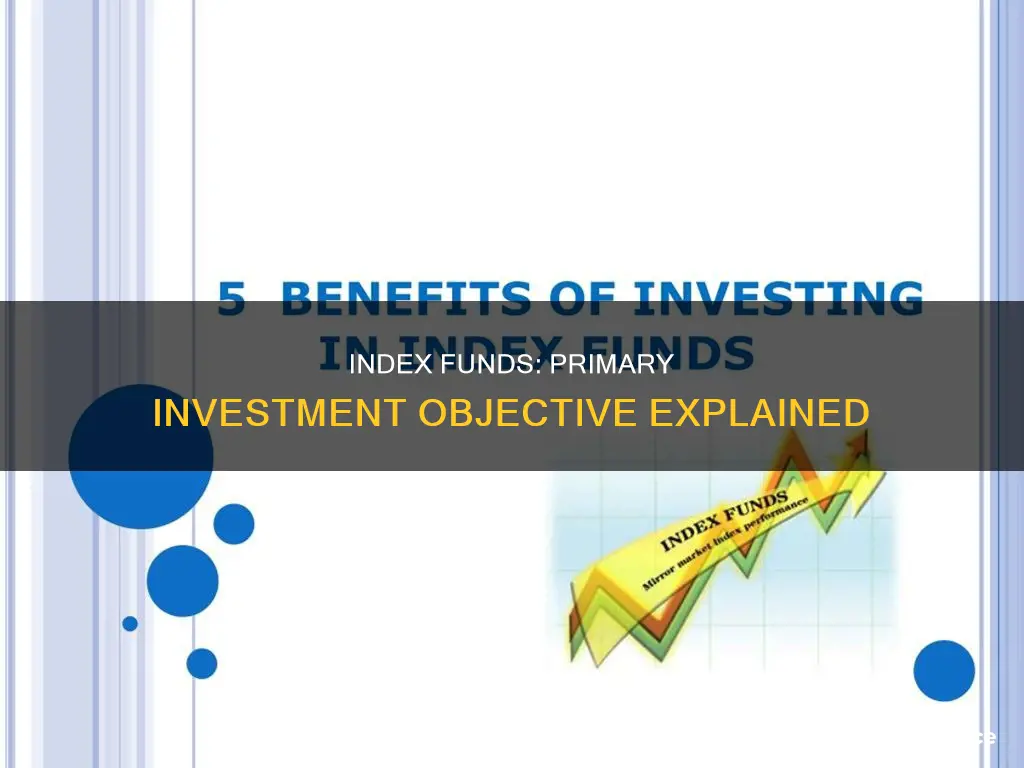
Index funds are a type of mutual fund or exchange-traded fund (ETF) that tracks the performance of a market index, such as the S&P 500, by holding the same stocks or bonds or a representative sample of them. The primary investment objective of an index fund is to achieve a return that is approximately the same as a particular market index. Index funds are a passive investment strategy, meaning they don't require active management and are designed to be a low-cost, low-fuss way to build wealth.
| Characteristics | Values |
|---|---|
| Type of fund | Mutual fund or exchange-traded fund (ETF) |
| Investment objective | To achieve the same return as a particular market index |
| Investment strategy | Passive |
| Holdings | Stocks or bonds of companies in a selected index |
| Management | Professional portfolio managers |
| Costs | Lower fees and expenses than actively managed funds |
| Taxes | More favourable income tax consequences than actively managed funds |
| Risk | Reduced through diversification |
| Trading | Less trading of the fund's portfolio than actively managed funds |
What You'll Learn

Index funds are a type of mutual fund or exchange-traded fund (ETF)
Index funds are passive investments, meaning they do not involve actively picking securities or timing the market. Instead, they employ a long-term strategy of tracking a specific market index. This passive strategy has led to a quiet revolution in U.S. equity markets, attracting a growing number of investors.
The primary advantage of index funds over actively managed funds is their lower fees. Index funds are also more tax-efficient, as they trade less frequently, resulting in fewer capital gains distributions. Additionally, they offer broad market exposure and diversification across various sectors and asset classes, reducing the risk of losing money.
When choosing an index fund, it is important to consider the fund's investment objective, risks, charges, and expenses. Some index funds may also use derivatives, such as options or futures, to achieve their investment objectives. It is crucial to carefully read the fund's prospectus and shareholder reports before investing.
Index funds can be purchased directly from a mutual fund company or a brokerage, or through a broker in the case of ETFs. They are a popular choice for investors seeking low-cost, diversified, and passive investments that often outperform higher-fee, actively traded funds.
Invest Wisely: HDFC Top 100 Fund Guide
You may want to see also

They aim to mimic the performance of an index, e.g. the S&P 500
Index funds are a type of mutual fund or exchange-traded fund (ETF) that aims to mimic the performance of an index, for example, the S&P 500. This means that an index fund will attempt to achieve the same returns as a particular market index by investing in the securities (stocks or bonds) of companies included in the selected index.
Index funds are considered a passive investment strategy because they don't require fund managers to actively select stocks or bonds for the fund. Instead, the fund manager buys all or a representative sample of the stocks or bonds in the index being tracked. This results in lower fees and expenses than more actively managed funds.
The S&P 500 is one of the most popular indexes tracked by index funds. It is a market capitalization-weighted index of 500 common stocks chosen for market size, liquidity, and industry group representation to track US equity performance. An S&P 500 index fund's value is based on the performance of the S&P 500 index, so a share in that index fund will generally increase in value as the total S&P 500 index does.
Other popular indexes tracked by index funds include the Nasdaq Composite Index, the Russell 2000, the Bloomberg US Aggregate Bond Index, and the Dow Jones Industrial Average.
Index funds offer investors several benefits, including lower costs, reduced risk through diversification, reduced human bias and error, and reduced investment taxes. However, there are also some drawbacks to consider, such as average market returns, possible tracking errors, no downside protection, and a lack of control over investment holdings.
Overall, index funds are a popular investment choice for those seeking low-cost, diversified, and passive investments that can provide solid long-term returns.
A Beginner's Guide to Index Funds Investing in Dubai
You may want to see also

Index funds are passively managed
Passive management is a style of management associated with mutual and exchange-traded funds (ETF), where a fund's portfolio mirrors a market index. It is the opposite of active management, in which a fund manager attempts to beat the market with various investing strategies and buying or selling decisions of a portfolio's securities.
Passive management is a reference to index funds and exchange-traded funds that mirror an established index, such as the S&P 500. It is a long-term strategy without actively picking securities or timing the market. Passively managed funds tend to charge lower fees to investors than funds that are actively managed.
The Efficient Market Hypothesis (EMH) demonstrates that no active manager can beat the market for long, and that longer-term, passive management delivers better returns. Followers of passive management believe in the efficient market hypothesis, which states that markets incorporate and reflect all information at all times, rendering individual stock-picking futile. As a result, the best investing strategy is to invest in index funds, which have historically outperformed the majority of actively managed funds.
Index funds are a low-cost way to track a specific group of investments, which can be more broadly diversified than individual stocks and simpler to buy than each of the individual holdings within the index. They are very popular for people looking to invest in a group of investments in a simple and cost-effective way.
The rise of passive funds has come about as they often convincingly outperform their actively managed peers. According to the widely followed S&P Indices Versus Active (SPIVA) scorecards, about 9 out of 10 actively managed funds didn't match the returns of the S&P 500 benchmark in the past 15 years.
Index funds are a simple, no-fuss way to gain exposure to a broad, diversified portfolio at a low cost for the investor. They are passively managed investments, and for this reason, they often have low expense ratios. In bull markets, these funds can provide attractive returns as the market rises. However, they also come with disadvantages. One is the lack of downside protection; in prolonged downtrends, these funds can perform poorly in line with the broader market.
Best Debt Funds to Invest in Amid Rising Rates
You may want to see also

They offer investors lower costs and taxes than other types of funds
Index funds are a type of mutual fund or exchange-traded fund (ETF) that tracks the performance of a market index, such as the S&P 500. They are designed to be a passive investment strategy, meaning they don't require active management. This passive management style results in lower costs and fees for investors.
Index funds have lower costs than actively managed funds because they don't require the same level of research and analysis. The fund manager of an index fund simply needs to replicate the performance of the chosen index, whereas an actively managed fund will have a team of analysts researching and selecting individual stocks or bonds. This additional work incurs higher fees, which are passed on to investors.
Index funds also tend to have lower trading costs. Because they are designed to replicate an index, they don't need to trade as frequently as actively managed funds. Actively managed funds, on the other hand, may trade more frequently in an attempt to generate higher returns. These additional trades result in higher transaction fees, which are ultimately paid by investors.
In addition to lower costs, index funds also offer tax advantages. Because they trade less frequently, index funds often have lower capital gains distributions. This results in a lower tax bill for investors, as capital gains are taxed.
The passive management style of index funds also leads to lower costs for investors in another way. Because the fund manager of an index fund is not actively selecting investments, there is less opportunity for human error or bias to impact the fund's performance. This means that index funds can provide more consistent returns, with lower costs passed on to investors.
Overall, the passive nature of index funds results in lower costs and taxes for investors. This makes them an attractive option for those looking for a simple, low-cost way to invest.
Mutual Fund SIPs: A Guide to Direct Investing
You may want to see also

Index funds are a low-cost, easy way to build wealth
The primary investment objective of an index fund is to achieve returns that closely match the performance of the underlying market index. This is achieved through passive management, where the fund's manager buys and holds all or a representative sample of the stocks or bonds in the index. As a result, index funds have lower fees and expenses compared to actively managed funds. The funds are well-suited for long-term investing and are a popular choice for retirement accounts.
Index funds offer investors a simple and cost-effective way to gain exposure to a diversified portfolio. They are also relatively lower maintenance and tend to have lower taxes due to reduced trading activity. Additionally, they provide broad market exposure and diversification across various sectors and asset classes, reducing the risk of losing money.
When investing in index funds, it is important to consider factors such as company size, geography, business sector, asset type, and market opportunities. It is also crucial to compare costs and features when deciding where to buy index funds, as management costs can vary significantly.
In summary, index funds offer a low-cost, accessible way to build wealth over time by mirroring the performance of a specific market index. They are a passive investment strategy that provides diversification and reduced risks for investors.
Best Countries to Invest in Mutual Funds
You may want to see also
Frequently asked questions
An index fund is a type of mutual fund or exchange-traded fund (ETF) that aims to mimic the performance of a certain market index, such as the S&P 500. Index funds are considered a passive investment strategy as they don't require active fund management.
Index funds are a low-cost, easy way to build wealth. They are passively managed and have lower fees than actively managed funds. They are also more tax-efficient and provide broader diversification.
Index funds offer average market returns and don't allow investors to pick and choose individual investments. They are subject to market swings and lack the flexibility of active fund management.
You can invest in an index fund by opening a brokerage account, an individual retirement account (IRA), or a Roth IRA. You can then use this account to buy shares of the index fund.
Some popular index funds include the Vanguard S&P 500 ETF, the Vanguard Total Stock Market ETF, and the Vanguard Total Bond Market ETF.







